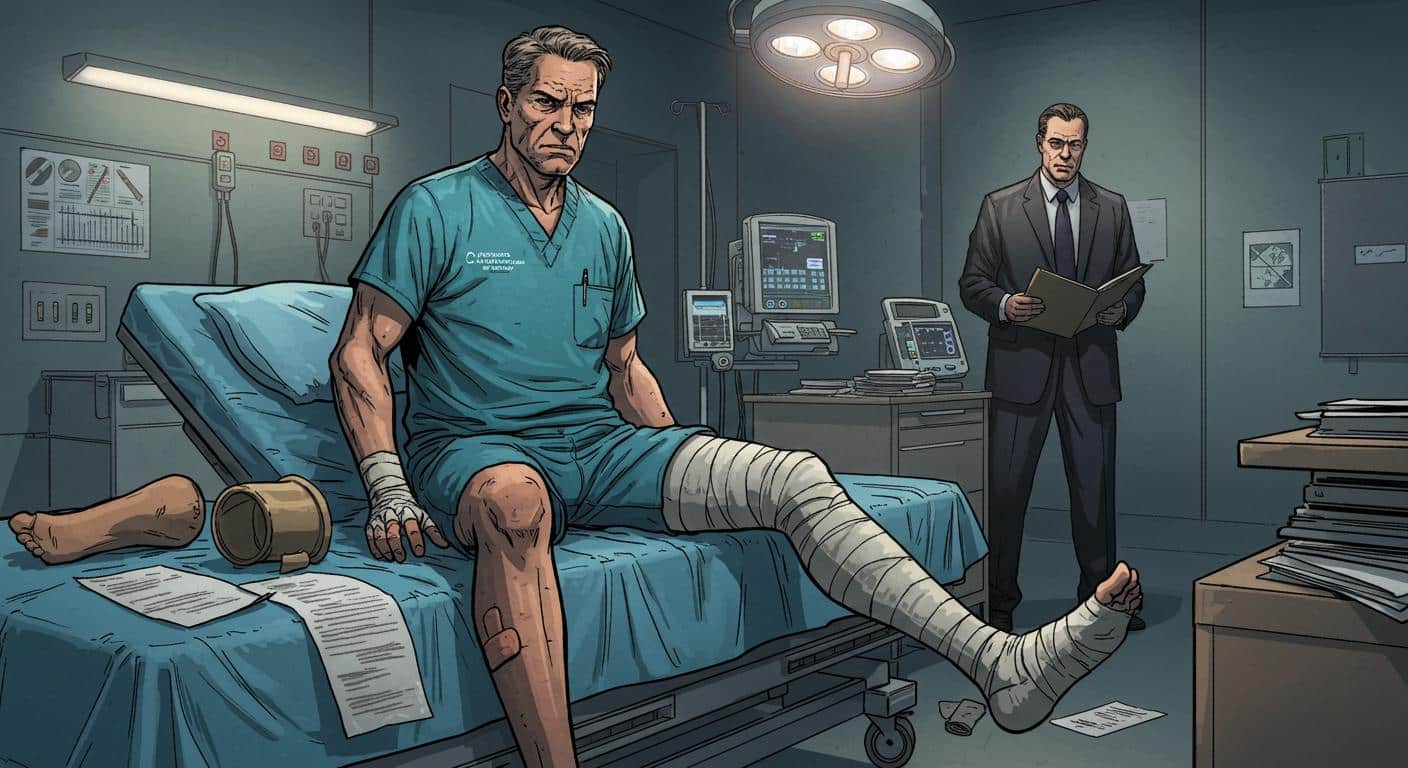There’s odd, and then there’s the saga emerging this week from Truro, Cornwall: a vascular surgeon allegedly orchestrating the loss of his own legs in a quest for insurance payouts. Neil Hopper, 49, a staple of local operating theatres, is now in the international spotlight for reasons that sound more like a fever dream than a legal case. As detailed in reporting by The Guardian, Hopper—once known for performing amputation surgeries—now stands accused of fraud relating to the loss of his own limbs, with allegations that seem ready-made for an anthology of medical oddities.
The Case: When Medical Drama Turns Inward
Hopper’s own account of his double amputation dates back to 2019, when, per his statements to the BBC, he attributed his leg loss to sepsis. He even recounted how he surprised medical teams with a rapid, almost superhuman recovery, claiming, “I did it in three hours,” contrasted with the three months he was told to expect. This became a sort of minor media phenomenon; here was a surgeon, allegedly more active after losing his legs, and even making it onto the shortlist for an astronaut program for people with disabilities, as described in details highlighted by The Guardian.
Fast-forward to the present court case, and things lose any feel-good gloss. Police allege Hopper deceived insurers by claiming his injuries were caused by sepsis rather than self-inflicted, intending to gain £235,622 from one insurer and £231,031 from another. According to the BBC, law enforcement charged him with two counts of fraud by false representation, actions that spanned June 2019 and involved convincing insurers the trauma was accidental.
The Liverpool Echo has reported that investigators suggest Hopper may have gone as far as allegedly infecting himself to trigger sepsis and legitimize the amputations for insurance claims—a scenario that, until now, would have seemed reserved for urban legend rather than court filings.
Into the Macabre: The Strange Online World
The details only grow more peculiar from here. Court records cited in the BBC coverage indicate that between August 2018 and December 2020, Hopper reportedly purchased videos from a website called The Eunuch Maker, which, as unsettling as it sounds, specialized in footage of limb removal. More head-scratching: police allege he encouraged an individual named Marius Gustavson to amputate the body parts of others—a charge of assisting in the commission of grievous bodily harm.
As the outlet documents, the specifics veer into the territory of digital subcultures and darker corners of medical fascination. What motivates someone in Hopper’s position not only to purchase such content but—allegedly—to nudge others toward these acts? Financial benefit and psychological compulsion often intersect in history’s stranger insurance cases, but adding the encouragement of harm to third parties adds a new, murky layer.
Despite the grisly overtones, officials told all outlets covering the case, including Tribune Online, that there’s no evidence Hopper’s conduct ever endangered the care of his own former patients. The Royal Cornwall Hospitals NHS Trust, where Hopper worked until his arrest and subsequent suspension in 2023, emphasized that the charges do not relate to his professional duties—a small solace amid the surreality.
Medicine, Motive, and the Boundaries of the Bizarre
The obvious question: what possibly compels a well-trained, clearly experienced surgeon to deliberately orchestrate the loss of his own legs? Medical history isn’t short of professionals who made themselves their own test subjects, sometimes in the service of science, other times in pursuit of spectacle or notoriety. Yet the methods and motivation suggested by these new charges feel especially intricate—part insurance fraud, part descent into niche online communities concerned with bodily transformation.
Is this simply an updated, internet-age take on the old “patient becomes the subject” dynamic that crops up in medical records from the stranger side of the archives? Library science—my own background—overflows with cases of physicians dabbling in self-experimentation, sometimes to the detriment or bafflement of their peers. But encouraging limb removal in others via the online ether? That feels like a step beyond even the most infamous pages of medical lore.
One can only speculate about the planning stages behind such actions—was it really a carefully orchestrated scheme, or more a gradual immersion into a world that blurs the boundaries between morbid curiosity and criminality? As noted in the Liverpool Echo, all this unfolds against a background where, until his arrest, Hopper was still regarded as an exemplary clinician.
Courtroom Curtain Call…For Now
With Hopper having made his first appearance before Cornwall Magistrates’ Court, the stage now shifts to Truro Crown Court in August, as the BBC also notes. He’s said nothing in his defense, and reporters have described a stolid figure declining to enter pleas—a sharp contrast to his former media interviews, where he spoke openly (and even with some humor) about the oddness of amputation as a surgeon.
Sometimes, stories arrive that reside squarely in the overlap of “outrageous but true” and “what does this say about us?” This is one of them. Was this a calculated act? An unusually extreme bid for a payout? Or is it simply evidence that the world remains—despite textbooks, case law, and insurance regulations—stranger than we’re ever quite prepared for? Even after combing through the peculiar archives of medical and insurance history, you have to wonder: are we seeing a new branch on the tree of human oddity, or just another fruit falling in ways only hindsight will explain? As this case winds its way through the system, the rest of us are left to puzzle over its place in the ever-expanding catalogue of the truly bizarre.







